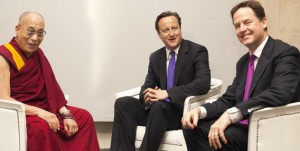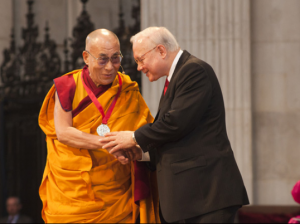The event awarding the £1.1 million Templeton Prize to His Holiness the Dalai Lama has been overshadowed by a diplomatic sparring match between China and the United Kingdom. China’s Foreign Ministry released a statement on 15 May 2012 claiming that a meeting between His Holiness and British Prime Minister David Cameron following the award ceremony was an “affront to the Chinese people” and amounts to support for Tibet’s independence.
The British government issued a stern response to Beijing, saying the prime minister is free to meet with whomever he chooses, but that the meeting was “not intended to hurt China.”
This would not be the first time China has rebuked foreign governments for meeting with the Tibetan spiritual leader. Following his UK visit, His Holiness began an 11-day trip to Austria that included a meeting with Austrian Chancellor Weyner Faymann. Dismissing China’s strong objections, the Austrian leader characterized the meeting as “a clear political signal for human rights, non-violence and dialogue against oppression.”
Meetings with the Dalai Lama remain a complex issue for Western governments, however. In recent years, many leaders have shown increased sensitivity toward China. Unlike some of his predecessors, for example, British Prime Minister David Cameron would not meet the Tibetan spiritual leader at his official Downing Street residence, and in 2009, President Barack Obama famously postponed his first meeting with the Dalai Lama over concerns about China.
Western leaders have usually stopped short of expressing outright political support for Tibet. Despite acknowledging His Holiness as an “important religious figure and advocate for peace,” the British Foreign Office said that meetings with British officials do not “necessarily indicate they support that individual’s viewpoint.”





 Print
Print Email
Email